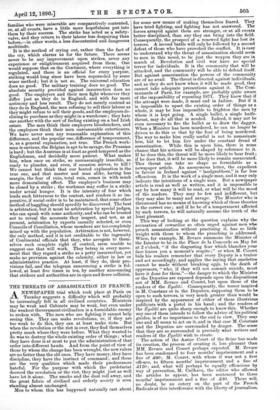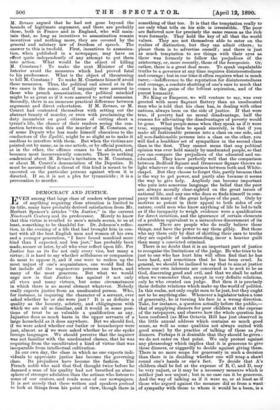THE THREATS OF ASSASSINATION IN FRANCE.
ANEWSPAPER trial which took place at Paris on Tuesday suggests a difficulty which will probably be increasingly felt in all civilised countries. Ministers may be weak and Cabinets may be weak, but even under the weakest Government civilisation is a formidable enemy to reckon with. The men who are fighting it cannot help seeing this. They can make revolutions, or, if they are too weak to do this, they can at least make riots. But when the revolution or the riot is over, they find themselves pretty much where they were before. What they wanted to do was to destroy the whole existing order of things ; what they have done is at most to put the administration of that order into different hands. And from the point of view of those by whom the change has been wrought, the new rulers are no better than the old ones. They have money, they have discipline, they have the instinct of command ; and these are the very qualities which made their predecessors hateful. For the purpose with which the proletariat decreed the revolution or the riot, they might just as well have let it alone. The smoke and the dust roll away, and the great fabric of civilised and orderly society is seen standing almost unchanged. Men to whom this has happened naturally cast about for some new means of making themselves feared. They have tried fighting, and fighting has not answered. The forces arrayed againt them are stronger, or at all events better disciplined, than any they can bring into the field. Consequently, the prospect of a renewed fight has lost its terrors. A second battle will only be followed by a second defeat of those who have provoked the conflict. It is easy to understand why the threat of assassination should seem to men in this mood, to be just the weapon they are in search of. Revolution and civil war have no special terror for individuals. It is the community that will be attacked, and the community will be able to defend itself. But against assassination the powers of the community are of no avail. The threat is directed against individuals, and as they do not know when it will be made good, they cannot take adequate precautions against it. The Com- munards of Paris, for example, are probably quite aware of the impossibility of repeating 1871. They know that if the attempt were made, it must end in failure. But if it is impossible to upset the existing order of things as a whole, it may be less impossible to frighten the men by whom it is kept going. A single bullet, a single knife- thrust, may do all that is needed. Indeed, it may not be even necessary to fire the bullet or to draw the dagger. When a Minister has been murdered, he can no longer be driven to do this or that by the fear of being murdered. The way to make him really useful is not to assassinate him, but to let him live under the constant dread of assassination. While this is upon him, there is some chance that his actions will be shaped by reference to it. If he does this, the threat will be more likely to bear fruit; if he does that, it will be more likely to remain unexecuted. This threat can take no shape so formidable as a newspaper article. An anonymous letter, the expedient in favour in Ireland against " landgrabbers," is far less efficacious. It is the work of a single man, and it may only indicate the intentions of a single man. But a newspaper article is read as well as written, and it is impossible to say by how many it will be read, or what will be the mood of the readers. They may be few and indifferent, but they may also be many and savage. The Minister who is threatened has no means of knowing which of these theories is the correct one ; and if he be of a temperament affected by such terrors, he will naturally assume the truth of the least pleasant.
This way of looking at the question explains why the accusation of cowardice so often urged against men whe preach assassination without practising it, has so little weight with those to whom the preaching is addressed. When, for example, M. Zevaco summons the Minister of the Interior to be in the Place de la Concorde on May let at 2 o'clock, "if the disgusting fear which blanches your face leaves you a moment's respite ;" or when M. Couret bids his readers remember that every Deputy is a traitor and act accordingly, and applies the saying that omelettes cannot be made without breaking eggs, to the death of oppressors, "who, if they will not commit suicide, must have it done for them,"—the danger to which the Minister or the Deputies are exposed depends upon the dispositions not of MM Zevaco and Couret, but upon those of the readers of the ggaiitg. Consequently, the terror inspired in M. Constans or in the Deputies, supposing them to be open to such terrors, is very much greater than would be inspired by the appearance of either of these illustrious publicists with a pistol in his hand ; and the readers of the ggalite are quite sharp enough to know this. Whether any one of them intends to follow the advice of his political guides, is of no importance to the end in view. They may one and all mean to act on it, and in that case M. Constans and the Deputies are surrounded by danger. The sense that they are so surrounded is precisely what writers and readers of the Pgalite wish to create. The action of the Assize Court of the Seine has made its creation, the process of creating it, less pleasant than MM. Zevaco and Couret perhaps expected. M. Zevaco has been condemned to four months' imprisonment and a fine of £40; M. Couret, with whom it was not a first offence, to fifteen months' imprisonment and a fine of £120; and, what will perhaps be equally efficacious by way of prevention, M. Cailhava, the editor who allowed the articles to appear, has been sentenced to three months' imprisonment and a fine of .240. There will, no doubt, be an outcry on the part of the French Radicals at this interference with the liberty of journalism. Af. Zeva,co argued that he had not gone beyond the bounds of legitimate argument, and there are probably those, both in France and in England, who will main- tain that, so long as incentives to assassination remain incentives and nothing more, they are covered by the general and salutary law of freedom of speech. The answer to this is twofold. First, incentives to assassina- tion, when published in a newspaper, may have an effect quite independently of any attempt to put them into action. What would be the object of killing M. Constans ? To make the next Minister of the Interior avoid the measures which had proved fatal to his predecessor. What is the object of threatening to kill M. Constans ? To make M. Constans himself avoid these measures. Thus, the political end aimed at in the two cases is the same, and if impunity were assured to those who preach assassination, the political mischief might be as great as if it were assured to actual assassins. Secondly, there is an immense practical difference between argument and direct exhortation. If M. Zevaco, or M. Couret had contented themselves with setting out the abstract beauty of murder, or even with proclaiming the duty incumbent on good citizens of cutting short a tyrant's life, the chance of their readers seeing the con- nection between this and the murder of M. Constans, or of some Deputy who has made himself obnoxious to the conductors of the Pgalite, might be so slight as to make it needless to interfere with them. But when the victims are pointed out by name, as in one article, or by official position, as in the other, the offence ceases to be abstract, and becomes most inconveniently concrete. There is nothing academical about M. Zevaco's invitation to M. Constans, or about M. Couret's denunciation of the Deputies. It must be assumed that a threat of this kind is meant to be executed on the particular persons against whom it is directed. If so, it is not a plea for tyrannicide ; it is a provocation to murder.



































 Previous page
Previous page